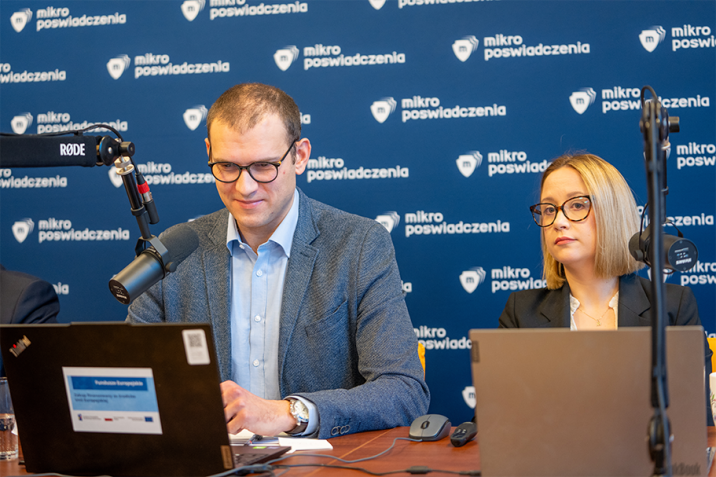
Direction: the quality of microcredentials
The microcredential project’s first pilot phase is now complete, and the second one has started. On the basis of a description standard proposal that was developed and implemented, the first microcredentials were issued in the Odznaka+ application. The project’s experts must now develop a quality assurance standard for microcredentials. Its fundamental importance was discussed on 18 December during the 4th meeting of the Microcredential Advisory Group.
Microcredentials – a landmark moment in the project
A summary of the first stage of the microcredential pilot, new features in the Odznaka+ application and, above all, the quality standard for microcredentials – these were the main topics discussed during the 4th meeting of the Microcredential Advisory Group organised by the Educational Research Institute (IBE).
The end of the year and the project’s breakthrough – the recent completion of Phase I of the pilot and the start of Phase II – prompted the event’s participants to take important stock.
‘The Odznaka+ application’s microcredentials pilot is at an important stage. We have developed and implemented a standard description proposal for microcredentials. Based on it, our partners – the issuers taking part in the pilot – have created initial versions of the microcredentials. Establishing the values, principles, and procedures that will enable us to guarantee the legitimacy and recognition of the issued certificates is another task to which we attach particular importance,’ says Dr Wojciech Gola, key expert on the design of digital solutions for skills development in the project ‘Microcredentials – piloting a new solution to support lifelong learning.’
Martyna Leciejewicz, key expert for the implementation of digital services in the microcredential project, noted how the cooperation between experts, pilot stakeholders and members of the Advisory Group has allowed the next phase to scale up:
‘Following the first stage, the participating companies provided us with extremely useful information, which increased our ambitions for the second stage’s design. Up to 16 entities are going to take part in it, including a strong university representation. We are putting a lot of work into obtaining additional microcredentials and expanding our quality assurance efforts.
Quality is the key
Undoubtedly, the most important issue raised at the meeting was the quality standard of microcredentials. The very word ‘quality’ is proving difficult to define. As for Poland, the problem of issuing the quality of microcredentials is complicated. Among other things, the standard must incorporate national realities, the EU Council’s proposed guidelines, and many other considerations, such as being comprehensible to application users.
‘Guidelines on how a quality assurance system for microcredentials should work can be found in the core document on the ‘European approach to micrcredentials’ – recommendations by the EU Council from 2022. As with other forms of educational activity, the quality assurance system for microcredentials should have both an external and an internal component, the latter being handled by the microcredential provider. The quality of a microcredential itself, including its compliance with standards and applicability to prospective recipients, as well as the quality of the procedures that lead to obtaining it, including training and learning outcome verification processes, should be the focus of the internal evaluation. The external evaluation should be about the institution and its quality assurance procedures, rather than about individual microcredentials,’ remarked Professor Andrzej Kraśniewski from the Conference of Rectors of Academic Schools in Poland.
During a presentation on this issue, Dr Wojciech Stęchły, the project’s lead expert on the design of digital solutions for skills development, emphasised that the creation of an appropriate quality assurance standard is key to creating the first microcredential ecosystem and a platform to issue and earn credible and recognised microcredentials and badges. He also pointed out that quality does not exist in a void. An important context is the mission statement, which sets the long-term direction and helps formulate its development goals.
‘In our project, we determine quality in two ways. On the one hand, we are building a solid foundation based on proven quality assurance methods, e.g. providing adequate resources and procedures and conducting evaluations. On the other hand, we want to introduce more flexible solutions, which also allow for quality feedback based on recommendations and evaluations,’ explained Dr Wojciech Stęchły.
In Dr Stęchły’s opinion, it is not possible to create at once a complex system full of dependencies and functioning in different contexts. Therefore, the project’s experts are working on further quality-relevant solutions, looking at how they interact with each other and how they function in practice. Several solutions developed this year have already gone through their first pilot tests: a standard for describing microcredentials, a microcredentials creator and quality assurance rules addressed to the issuers.
‘Prior discussions with pilot participants and the Microcredential Advisory Group highlighted the importance of developing solutions that are comprehensible to everybody. It is important to bear in mind that the recipients of quality assurance solutions will be people from a variety of backgrounds, not just the Polish Accreditation Committee (PKA), education quality experts or examination centre staff. For this reason, we try to present the entirety of the solutions in a structured way, i.e. as interconnected: guiding values, principles and the tools and solutions to implement them,’ Dr Stęchły pointed out.
The meeting’s participants were told that in the following months, the project’s experts will reflect on the choice of solutions to use recommendations as a toolkit to complement the criteria-based approach, assessments and reporting.
The 4th meeting of the Microcredentials Advisory Group was attended by:
- Michał Goszczyński, the Ministry of Science and Higher Education
- Justyna John, the Ministry of Digital Affairs
- Szymon Kurek, the Polish Agency for Enterprise Development
- Dr. Barbara Worek, Jagiellonian University, Sectoral Competence Council for the Development Services Sector
- Małgorzata Lelińska, the Polish Confederation Lewiatan
- Prof. Andrzej Kraśniewski, Conference of Rectors of Academic Schools in Poland
- Agnieszka Dec, the Ministry of Development Funds and Regional Policy
- Tomasz Kulasa, Director of the Innovation and Development Department at the Ministry of National Education
